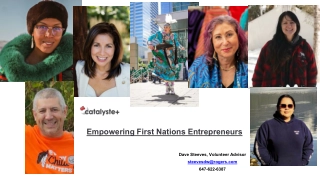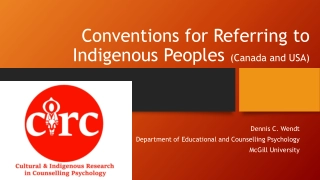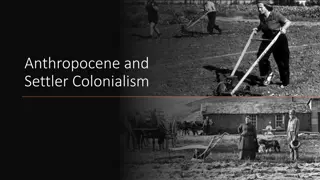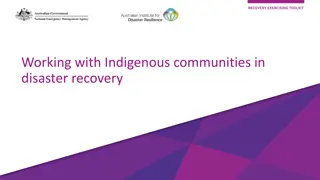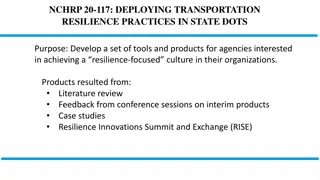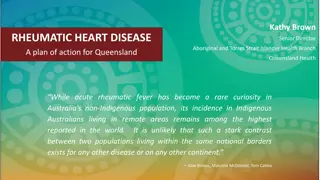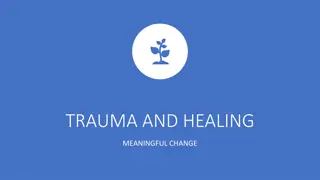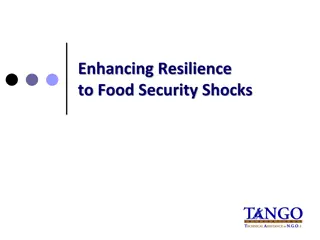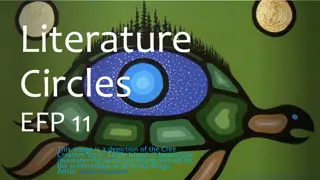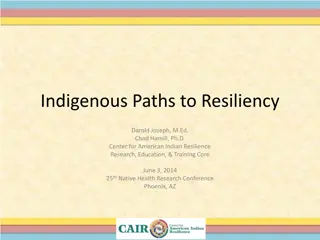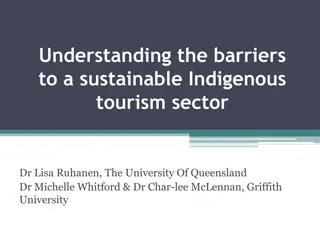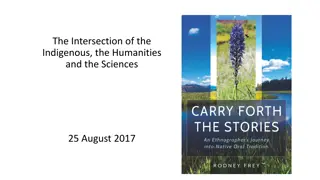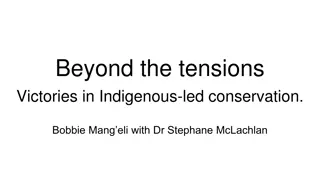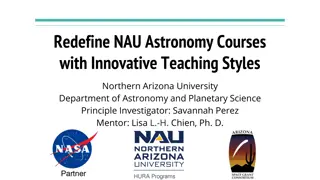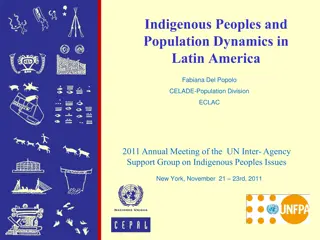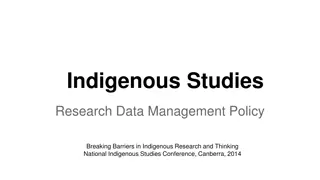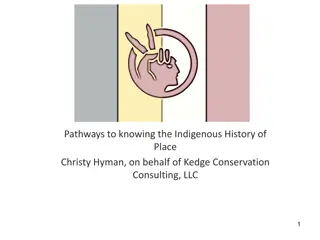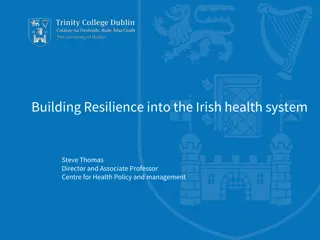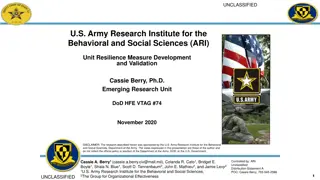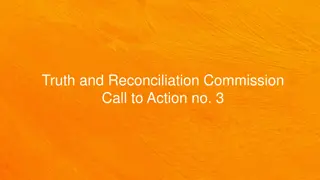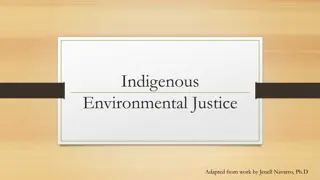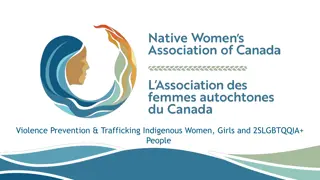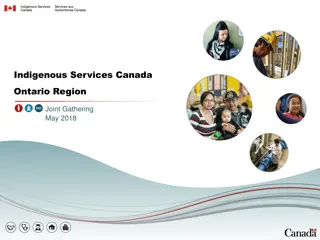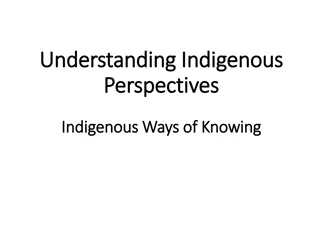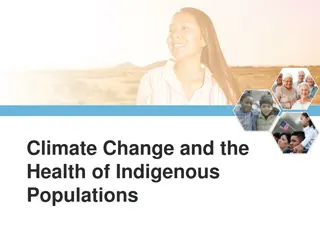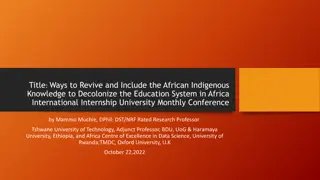Empowering First Nations Entrepreneurs
Empowering First Nations Entrepreneurs is a program by OFNEDA, a Canadian economic development organization, providing guidance and support to Indigenous entrepreneurs. The initiative matches Indigenous partners with experienced volunteer advisors to enhance capacity-building and facilitate communit
0 views • 28 slides
Conventions for Referring to Indigenous Peoples in Canada and the USA
This article outlines guidelines for referring to Indigenous Peoples, emphasizing specificity and respect for preferred names and terms. It discusses the importance of capitalizing terms related to Indigenous Nations and cautions against using terms implying colonial possession. The use of terms lik
1 views • 24 slides
Enhancing Educational Resilience with RESTA Model
RESTA is an evidence-based intervention model designed to boost Educational Resilience in young individuals by involving educational staff. It differs from other support models by incorporating insights from educational resilience and trauma-responsive practices. Two underpinning models and RESTA pr
0 views • 12 slides
Cummins Supply Chain Resilience Session Overview
Explore how Cummins has invested in supply chain resilience after a major flood in 2008, including partnering with Horizonscan for a Supplier Resilience Program. Discover insights into their approach, benefits to suppliers, and the importance of supplier resilience. Follow their journey and internal
1 views • 10 slides
Understanding Settler Colonialism and Its Impact in the Anthropocene
Settler colonialism, a structure of domination, aims to permanently transfer settlers to Indigenous lands, leading to ongoing dispossession and conflict. This form of colonialism disrupts Indigenous nationhoods, political practices, and sovereignties. The dispossession of Indigenous bodies and lands
0 views • 8 slides
Indigenous IT Apprenticeship Program Overview
The Government of Canada's IT Apprenticeship Program for Indigenous Peoples offers a comprehensive 24-month term appointment to develop Indigenous individuals into IT professionals. Supported by the Office of Indigenous Initiatives, the program provides hands-on work experience and online training,
0 views • 6 slides
Understanding Stress and Resilience in Older Adults
Explore the complex interplay between stress and resilience in older adults, examining models of physical and neurological resilience, recovery trajectories after hip fracture, and dynamic indicators of resilience. Considerations include psychosocial resilience factors like external support, social
0 views • 19 slides
Understanding Indigenous Communities in Disaster Recovery
Increased understanding of intrinsic strengths and unique impacts of disasters on Indigenous communities, role of Indigenous community-controlled organizations, importance of connection to Country, and need for engagement with Indigenous communities by emergency management agencies. Disasters have u
0 views • 21 slides
Building Resilience: A Guide for Families
Explore examples of adversity and the importance of resilience. Learn what resilience is, how it can be developed, and why it matters. Discover ways parents and caregivers can assist children in building resilience through practical strategies. Myth versus reality around resilience is debunked, emph
0 views • 15 slides
Disaster Resilience Strategy in Developing Countries Vulnerable to Natural Disasters
The IMF's policy paper highlights key challenges faced by small states in building resilience, such as under-investment and donor support post-disaster rather than pre-disaster. The Disaster Resilience Strategy (DRS) emphasizes three pillars for intervention: post-disaster resilience, financial resi
0 views • 11 slides
Deploying Transportation Resilience Practices: Tools and Insights
Develop tools for fostering a resilience-focused culture in state DOTs through literature review, case studies, and feedback. Explore various definitions of resilience, including organizational perspective, and key observations from the Transportation Resilience Innovations Summit. Emphasize the imp
0 views • 32 slides
Addressing Rheumatic Heart Disease Disparities in Indigenous Australians
Rheumatic heart disease (RHD) continues to disproportionately affect Indigenous Australians, particularly those living in remote areas, with a high incidence compared to the non-Indigenous population. Acute Rheumatic Fever (ARF) is a key precursor to RHD, often linked to social determinants and poor
0 views • 7 slides
Exploring Trauma, Healing, and Indigenous Perspectives
Within this content, we delve into the profound themes of trauma, healing, and meaningful change from the perspective of Indigenous peoples. Through acknowledging elders, discussing core principles such as courage and compassion, and reflecting on the impacts of colonial oppression, a narrative of s
2 views • 33 slides
Relationship Between Health and Deaths in Custody in Australia
In Australia, the relationship between prisoner health and deaths in custody is a critical issue. Indigenous inmates are disproportionately affected, with higher death rates compared to non-Indigenous inmates. Addressing prisoner health may offer a potential solution to reducing custodial deaths. Th
0 views • 32 slides
Understanding Resilience in Food Security Shocks
Resilience in the context of food security shocks involves the ability of individuals, households, communities, and systems to bounce back and recover from various stressors. This resilience is crucial in regions facing continuous crises like the Horn of Africa and the Sahel, where factors beyond we
1 views • 21 slides
Understanding Resilience: A Comprehensive Exploration
Resilience is portrayed as a dynamic process rather than an inherent trait, accessible to all individuals. The capacity for resilience can be developed and harnessed through various resources and support systems. This narrative delves deep into the ordinary yet powerful aspects of resilience, emphas
1 views • 13 slides
Indigenous Stories of Resilience and Healing
This collection showcases powerful Indigenous narratives that delve into themes of sacrifice, healing, cultural identity, and the impact of colonization. Through stories like the Cree Creation Story and novels such as "Monkey Beach" and "Split Tooth," readers are taken on a journey exploring the com
0 views • 9 slides
Exploring Indigenous Resilience in Native Communities
This content delves into the concept of resilience within Native American communities, discussing factors that contribute to individual and cultural resilience, as well as examining risk and protective factors. It highlights the importance of cultural identity, spirituality, and positive relationshi
3 views • 11 slides
Understanding Barriers to Sustainable Indigenous Tourism Sector
Globally, tourism is seen as an opportunity for Indigenous communities. However, barriers such as economic challenges, declining demand, and competition pose significant obstacles. Research conducted in Australia aims to analyze the gap between supply and demand in Indigenous tourism and explore the
0 views • 15 slides
Building Resilience: From Stress to Strength
Psychological resilience allows individuals to bounce back from stress, adversity, and change effectively. This book by Gaynor Parkin delves into what promotes resilience, highlighting the importance of everyday habits and exercises in building resilience. The evidence presented covers the role of p
0 views • 23 slides
Exploring the Intersection of Indigenous, Humanities, and Sciences
The narrative delves into the rich tapestry where Indigenous traditions, Humanities, and Sciences meet, highlighting the contrast in approaches like logical reasoning in Sciences, spiritual origins in Indigenous knowledge, and interpretive wisdom in Humanities. It emphasizes the holistic, narrative-
0 views • 9 slides
Settler Colonialism and Carcerality: Disrupting Indigenous Relationships and Territories
This study delves into the impact of settler colonialism on Indigenous peoples, focusing on the immobilization and movement imposed on them through carceral spaces. It explores the intersections of official and unofficial carceral spaces, shedding light on the disrupting effects on Indigenous relati
0 views • 8 slides
Victories in Indigenous-Led Conservation: A Story of Partnership and Resilience
Explore the triumphs and challenges of Indigenous-led conservation efforts in Canada through community-based initiatives, the establishment of Indigenous Protected and Conserved Areas, and programs like the Guardian and Watchmen Program. Learn about the significant milestones, definitions of key ter
0 views • 23 slides
The Role of UN in Indigenous Peoples: A Critical Analysis
The research delves into the role of the United Nations in addressing the unique social, cultural, economic, and political qualities of indigenous peoples worldwide. It discusses the importance of recognizing indigenous rights, traditions, and the challenges they face in contemporary societies, emph
0 views • 7 slides
Innovating Astronomy Education at NAU Through Indigenous Perspectives
Explore how Northern Arizona University is reshaping astronomy education using innovative teaching styles with a focus on Indigenous Astronomy. Gain insights into effective teaching methods, the importance of Indigenous Astronomy lab content, teaching approaches, and creating engaging lab materials.
0 views • 7 slides
Indigenous Peoples and Population Dynamics in Latin America
Latin America is a region with diverse indigenous groups, facing demands for recognition and rights. The importance of information, especially from censuses, is crucial for developing policies and programs to support indigenous peoples. Various data sources such as censuses, surveys, and registries
0 views • 19 slides
Indigenous Studies Research Data Management Policy: Breaking Barriers in Indigenous Research
Covering cultural rights, Indigenous data custodianship, policy developments, and ATSILIRN protocols, this presentation at the National Indigenous Studies Conference in 2014 highlights key issues and approaches in managing research data in Indigenous studies.
0 views • 61 slides
Understanding the Impacts of Colonialism on Indigenous Communities
The article delves into how East Coast Indigenous communities were profoundly affected during the colonial period and beyond, enduring forced removals, enslavement, attempted genocide, and subjugated statuses. It explores the historical realities that continue to shape the presence and representatio
0 views • 18 slides
Indigenous Recruitment Action Plan Overview
CIRNAC Yukon developed an Indigenous Recruitment Action Plan focusing on three themes: Outreach, Renewing the job advertisement, and Mentorship. The plan includes various activities such as attending job fairs, partnering with colleges, and creating employee profiles to attract local Indigenous cand
0 views • 12 slides
Enhancing Resilience in the Irish Health System During Economic Contractions
The Resilience Project conducted at Trinity College Dublin focused on fortifying the Irish health system amidst economic challenges. The project aimed to identify strategies to protect health resources, manage scarcity, pursue reforms, and anticipate future crises. Three key pillars of health system
0 views • 27 slides
Understanding Unit Resilience in the Army: Research Insights
Resilience at the unit level in the Army is essential for sustained performance and readiness. This research project, sponsored by the U.S. Army Research Institute, focuses on measuring and understanding team resilience components and their impact on overcoming stressors. The study aims to validate
0 views • 22 slides
Call to Implement Jordan's Principle for Indigenous Children
The Truth and Reconciliation Commission's Call to Action No. 3 emphasizes the need for all levels of government to fully implement Jordan's Principle, which prioritizes the needs and well-being of Indigenous children. Highlighting the story of Jordan River Anderson, the call underscores the importan
0 views • 19 slides
Indigenous Rights Litigation in Canadian Law: A Review of 2020-2022
Strategic considerations in Indigenous rights litigation, social acceptability in decision-making, Indigenous identities, and future expectations were discussed in a review from November 21, 2022. The case of Southwind v. Canada highlighted issues of fiduciary obligations and equitable compensation
0 views • 50 slides
Understanding Indigenous Environmental Justice & Biodiversity Interconnection
Exploring the intricate relationship between Indigenous environmental justice, biodiversity, and cultural diversity as discussed by Jenell Navarro, Ph.D., and Winona LaDuke. The impact of settler colonialism, capitalism, and loss of Indigenous populations on environmental degradation is highlighted.
0 views • 9 slides
Understanding Violence Prevention and Trafficking in Indigenous Communities
Explore key terms like assimilation, colonialism, discrimination, grooming, and human trafficking in the context of Indigenous women, girls, and 2SLGBTQQIA+ people. Learn about concepts such as intergenerational trauma, patriarchy, racism, and settler colonialism that impact these communities. Under
0 views • 32 slides
Indigenous Services Canada Achievements and Initiatives Overview
Indigenous Services Canada in Ontario region held a joint gathering in May 2018, leading to the formation of a new department focusing on improving health outcomes for Indigenous communities. The department has made significant strides in enhancing services such as healthy child development, mental
0 views • 25 slides
Exploring Indigenous Knowledge in Education
Delve into Indigenous ways of knowing, understanding, and learning, emphasizing the importance of integrating traditional Indigenous pedagogies in education. Learn about the characteristics, sources, and values of Indigenous knowledge, and explore the intersection of Indigenous knowledge with Wester
0 views • 46 slides
Impact of Climate Change on Indigenous Health in the United States
Climate change poses significant risks to the health of Indigenous populations in the United States. The US Climate Health Assessment highlights these risks and emphasizes the vulnerability of tribal communities. Factors such as food insecurity, water scarcity, and air quality issues exacerbate exis
0 views • 9 slides
Reviving African Indigenous Knowledge for Decolonizing Education
Mammo Muchie, a distinguished DPhil and research professor, will address the urgent need to revive African Indigenous Knowledge within the education system to decolonize it effectively. The conference will explore the key characteristics of Indigenous Knowledge, highlight the exemplary model of Imho
0 views • 84 slides
Australians Reject Indigenous Advisory Panel: Impact & Challenges
Australians recently voted against establishing an Indigenous advisory panel, highlighting inequities faced by Indigenous Australians. The referendum faced misinformation and lacked clarity on its benefits. The rejection raises questions on addressing Indigenous issues, impacting Australia's global
1 views • 5 slides
